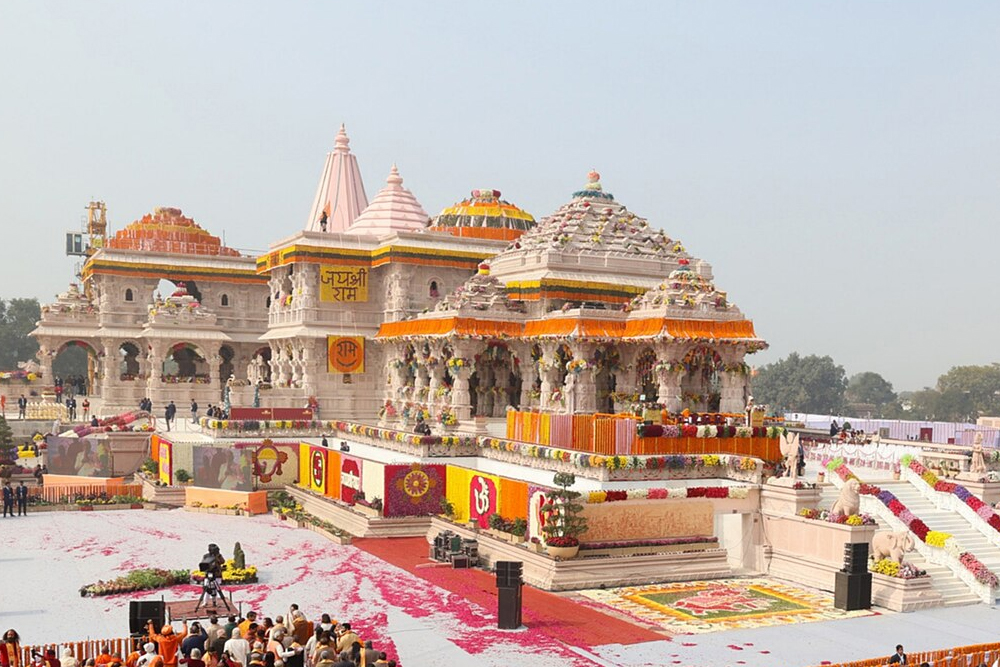Ram Mandir: A Symbol of Faith and Controversy
- Home
- Ram Mandir: A Symbol of Faith and Controversy
Ram Mandir: A Symbol of Faith and Controversy

The Ram Mandir, translating to 'Rama Temple,' represents an ongoing construction project in Ayodhya, Uttar Pradesh, India. According to Hindu tradition, it is believed to occupy the sacred site of Ram Janmabhoomi, the mythical birthplace of Lord Rama, a central figure in Hinduism. The temple's formal inauguration took place on 22 January 2024 following a prana pratishtha (consecration) ceremony.
The site holds historical significance as the former location of the Babri Masjid mosque, erected between 1528 and 1529. In 1992, the mosque was demolished after idols of Rama and Sita were placed inside in 1949, leading to years of legal dispute. In a landmark ruling in 2019, the Supreme Court of India granted the land to Hindus for the construction of the temple, while allocating nearby land in Dhannipur for a mosque.
On 5 August 2020, the ground-breaking ceremony (bhumi pujan) for the Ram Mandir commenced under the auspices of Prime Minister Narendra Modi. Currently, the temple complex is under construction, overseen by the Shri Ram Janmabhoomi Teerth Kshetra Trust. Modi himself presided over the prana pratishtha ceremony during the temple's inauguration, serving as the chief patron of the rituals.
Despite its spiritual significance, the Ram Mandir project has faced controversies, including allegations of donation misuse, marginalization of key activists, and politicization by the Bharatiya Janata Party.
Trending Services For More Services Click here

News Portal Website Development Company In India
Website Designers

Edit connect you to customers
Business

Ram Lal Khachodi wala
Food and beverages

Neelam Sales Agency
Wallets

Neelam Sales Agency
Food and beverages

Trimwebsolutions 123
Website Designers

Trimwebsolutions 123
Sofas

Trimwebsolutions
Website Designers

Trimwebsolutions 123
Sofas

website design
Wallets

Neelam Sales Agency
Monitors

Khushboo Sales Agency
Fashion

website design
Sunglass

Accounting Service
Professional Services

Website Design and Development Company
Website Designers

Website Design and Development Company
Website Designers

Website Design and Development Company
Website Designers

Amit Repair Shop
Repairs

World Wide Printers
Printers

NHL Electro Hub Electronic Goods Showrooms
Electronics

Neelam Sales Agency
Computers

Bansal Properties
Business

Fresh & Fine Restaurant
Restaurant

High On Food
Restaurant

Lord of the Drinks East
Restaurant

Breakin’ Brew
Restaurant

Desi Punjabi Rasoi
Restaurant

Maini's Green Leaf Maini's Green Leaf
Restaurant

The Barbeque Company
Restaurant

Promenade - Indian Restaurant
Restaurant

The Salt Cafe Kitchen & Bar
Restaurant

PUNJABI CAFE
Restaurant

PUNJABI CAFE
Restaurant

Anardana East Delhi
Restaurant

The Yellow Chilli
Restaurant

BARAAMDA KITCHEN
Restaurant

QD's Restaurant
Restaurant

The Barbeque Company
Restaurant

Barsoom frat House
Restaurant

Haldiram's - Lajpat Nagar
Restaurant

The Big Chill Cafe
Restaurant

Abhishek Restaurant
Restaurant

Olive Bar & Kitchen
Restaurant

In The Punjab in delhi
Restaurant

Tastes of food
Restaurant

Nayak South Indian Foods
Restaurant

Empress Of China
Restaurant

The Clay Oven Restaurant
Restaurant

Barbeque Nation
Restaurant

Dream circle pizza
Restaurant

The Irish House, Nehru Place
Restaurant

Music & Mountains Hillside Cafe
Restaurant

Crazy kitchen
Restaurant

Noire - Live Kitchen
Restaurant

J U G G E R N A U T
Restaurant

FIO - Cookhouse & Bar
Restaurant

Oh! Calcutta
Restaurant

Kiara Soul Kitchen
Restaurant

Olive Bar & Kitchen
Restaurant

Madurai South Indian Food
Restaurant

Branch kitchen and bar
Restaurant

Burma Burma Restaurant & Tea Room
Restaurant

The South Delhi Kitchen
Restaurant




